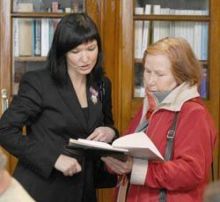Dr. Tatiana TAIROVA-YAKOVLEVA, a historian from St. Petersburg, stood out among the participants of the recent international conference, “Ivan Mazepa and His Age: History, Culture, and National Memory.” She is a professor of history and the head of the Center for the Study of Ukrainian History at the Department of Slavic and Baltic History at St. Petersburg State University. She is also the author of Mazepa, which was published as part of the popular Russian series Zhyzn zamechatelnykh liudei (The Lives of Remarkable People).
Her next book, incorporating her extensive research on various aspects of Mazepa’s relations with the Russian government, is scheduled for publication in 2009. This work is based on new archival data, a large portion of which, according to Tairova-Yakovleva, will be a great surprise even to many historians who specialize in Mazepa. President Yushchenko awarded the Russian professor the Order of Princess Olha, 3rd Class, for her research on Ukrainian-Russian relations. Below is Dr. Tairova-Yakovleva’s interview with The Day.
Why does the stereotype of Mazepa as a traitor still persist in Russian historiography?
“It seems to me that the main reason is that no one in Russia has done any research focused specifically on Mazepa. Right now some serious changes are afoot. Even such specialists from the older generation as Vladimir Artamonov are judging the Ukrainian hetman in a different way. They are now talking about his switch to the Swedes rather than treason. That is to say, new and more correct, more moderate assessments are emerging, and this is a great accomplishment.”
How did you, a Russian historian, become interested in the Ukrainian Hetman Mazepa?
“In 2003 I was asked to contribute an article on Mazepa to a leading Russian scholarly periodical published by the Institute of General History, which would reflect the new, non-traditional Russian view of this figure. After the article was published, I received an offer from the Molodaia Gvardiia Publishing House to write a book on Mazepa for their series.”
What is your impression of Mazepa?
“He was a very interesting person and a multifaceted personality. Certain impulsive actions were germane to him, but at the same time he was fairly considerate and diplomatic. In general, Mazepa is a remarkable figure that will, I think, pique interest for centuries to come. I have a deep professional interest in him.”
You are credited with uncovering a duma that was written by Mazepa. What kind of work is it?
“I found it among the materials of the so-called Baturyn archive in St. Petersburg. This duma is only extant in a Russian translation based on the original Polish version. In his work Mazepa is clearly reflecting on his affair with Motria Kochubei, his carnal desires, his personal experiences, etc.”
Could Charles XII and Mazepa have won the Battle of Poltava? If so, under what conditions?
“History does not tolerate the conditional mood. I believe that their victory at Poltava was impossible, and Mazepa understood this during his first visit to Charles XII. In general, switching to the side of the Swedes was more of a challenge to fate and, to a certain extent, an act of despair. A very wise man and a brilliant politician, he understood the Swedish king’s slim chances of success, but at that point the policies of the Russian Empire no longer suited him either.”
In 1705 Peter I fell seriously ill and was even expected to die. Would the histories of Russia, Ukraine, and Sweden have been different if he had not recovered?
“It was hardly possible to reverse the changes that had already taken place in the Russian Empire by then. Paradoxically and tragically, Mazepa himself played a major role in this. When Peter I died in 1725, there were attempts to adopt a new course, but the path of history showed that these changes were already irreversible. Furthermore, by 1725 Peter I had cultivated a host of like-minded supporters, who were generally implementing his ideas for creating the Russian Empire.”
In your opinion, what should be done to bolster Ukrainians’ familiarity with Hetman Mazepa and his age?
“Publish my book in Ukrainian (laughs.) Seriously, it is necessary to continue serious research into Mazepa’s hetmanate. This will reveal new facets of his life, making him a more attractive and interesting figure for the public at large.”







